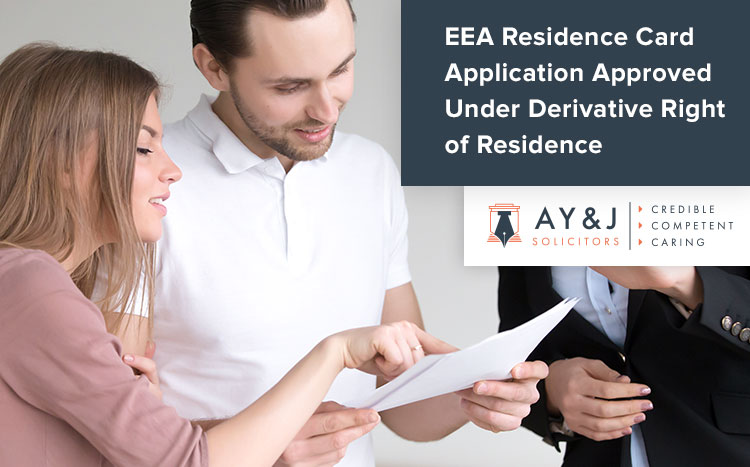EEA Residence Card Application Approved Under Derivative Right of Residence
Below is a summary of how we assisted one of our clients whose child was a British citizen.
Our client first arrived in the UK in May 2008 as a student. Whilst in the UK, our client met his wife, a British citizen and in 2012, the couple got engaged and subsequently start living together. Following his marriage to a British citizen, our client returned to his home country of residence and applied for entry clearance as the spouse of a British citizen under the UK Immigration Rules. Two years later their first child was born and because of the mother’s immigration status, the child retained British citizenship.
Permanent Residence Card Application for EEA Nationals Successful!
In-Country Settlement Application Refused by Home Office
In 2015, our client’s wife was diagnosed with a life-threatening illness and in February 2016 she tragically passed away. Following her death, he submitted an in-country settlement application under the UK Immigration Rules as a bereaved partner. The application was submitted at the Premium Service, however on the day of his appointment he was informed that his application would be retained for further investigations. Mid-2016, our client received a decision on his settlement application, where he was informed that he was refused due to allegations of deception for sitting and submitting a TOEIC language test. Although the settlement application was refused while he still had leave to remain as the spouse of a British citizen, by the time an appeal would have been resolved, he would have had no continuous 3C leave to entitle him to retain his right to work to be able to provide for his child.
EEA Residence Card Was the Option
Our client’s right to work was very important for him and his child.
Our client’s right to work was very important for him and his child. Without it he would have struggled financially to provide shelter, food, and clothing. Despite of his ongoing appeal matter, our experts advised our client to apply for a Residence Card under the EEA Regulations 2016 as the carer of a British child. This route would give him immediate right to work. When assessing Derivative Rights of Residence based on the Court of Justice of the European Union (CJEU) judgement in Ruiz Zambrano (C34/09), the Secretary of State gave five stages to consider whether a person has a derivative right of residence. Using this guide when preparing for the Residence Card application, our experts ensured that our client satisfied these five categories:
- Stage 1 – Assessing British citizenship of the EEA national;
- Stage 2 – Direct Relatives or Legal guardians
- Stage 3 – Primary carers
- Stage 4 – British citizen forced to leave the UK and EEA
- Stage 5 – public policy, public security and public health
Derivative Rights of Residence Used to Gain EEA Residence Card
Within three weeks of submitting our client’s Residence Card Application, he received the certificate of application, containing a confirmation of his right to accept offers of employment. Less than two months from the date the application was submitted, our client was granted a Right of Residence to remain in the UK and care for his British child.
We are happy to have helped this family to continue to reside in the UK, and that our client was able to retain his right to work and continue working for his long-term employer. If this option had not been available to him, he would have struggled financially to look after himself and his child.
A Y & J Solicitors is a multi-award-winning UK immigration law firm with over 14 years of specialist experience. Based in Central London, we are recognised and recommended by The Legal 500, Chambers Partners authorised by the SRA (Solicitors Regulation Authority). Having successfully assisted more than 5,000 clients, we stand by our ‘In It To Win It’ approach to deliver results with precision and care. For your peace of mind, we are proud to hold a trust rating of 4.9/5, backed by over 1,000 reviews on Trustpilot and Google.
Tips to Choose a Right UK Immigration Lawyer














I know A Y & J Solicitors for many years now and instructed them for various UK immigration matters. But specially I like to talk & thank about my mother’s latest EEA residence permit under ‘Surinder Singh’ route that has been approved in the ‘First instance’. It was a very complex immigration application under EU regulation but with the help of YDVISAS and team, this became a dream come true. I always received a full assurance and a complete hand holding support throughout the application process. I am united with my mother in the UK with the top technical knowledge of EU regulation, relentless efforts and honest – humble approach of A Y & J Solicitors. Saying ‘Thank you’ won’t be enough here, having my mother with me in the UK is a lot more than any words I describe my appreciation with. I highly recommend A Y & J Solicitors to anyone who is looking for professional support in relation to UK immigration including EU regulation / Surinder Singh route.